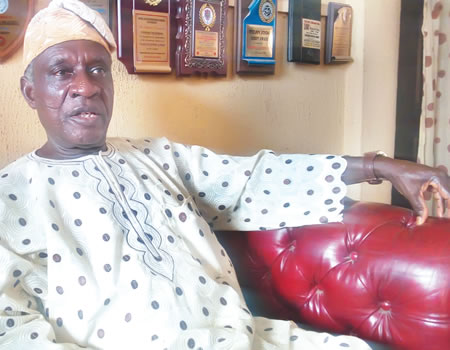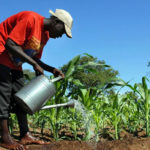Can you let us into the personalities of your parents?
My father was Prince Alhaji Raji Akee Obayannitan Ladigbolu. My mother was Ayomo Muniratu Aderonke Ladigbolu. They are both late but enjoying a good place in my memory till date because of what they symbolized to me, not only as biological parents but also as my genuine guardians who stood by me from childhood through different phases of my life till they passed on to glory at 76 and 82 respectively. My mother lived longer that my father.
What were their occupations?
My father was a self-employed person doing business, especially contract jobs. My mother was also a trader.
What did they, especially your mother, tell you about the circumstance leading to your birth?
I can recall that my mother said when she was pregnant, she encountered a strange traditional man, who approached and informed her that the baby she was carrying was going to be a male a famous child whose name would be heard in far and near. The man, according to my mother, told her to take good care of the pregnancy but warned that she must keep the information close to her chest. But my mother said she found it difficult to hide the development from her husband. She walked up to him and broke the news and my father urged her to comply with the instruction and continue to pray. And when the time was ripe, she had a normal delivery on June 27, 1938. I happen to be the first child of my parents. In fact, I am the only child my mother had. You can now imagine how precious I was to them. Although my father ran a polygamous family because he was prince, popular in the town and a Muslim, he was a father every child would pray to have. I can say that I was closer to him than any other person. He was hardworking, industrious, sociable, and chronicler of record. He always took me along to see how he mediated feuds and organized his age groups. He was loved and always a cynosure of all eyes in the town. He loved Oyo culture and did everything to preserve it in his lifetime. He was blessed with a good, beautiful voice as much as he was a singer. His brilliance and articulation really influenced my metal development.
You are a renowned clergyman, yet your parents were Muslims. Can you explain this grey area?
There is nothing hidden there. I was born into a Muslim family and given a Muslim name. I was AbdulHammed which is corrupted to be Lamidi. At childhood, I was enrolled to acquire Islamic education (Ile Keu) at Elega compound, along Opapa side of Oyo. Having completed that elementary level, I moved to have additional study at Sarumi, opposite the palace, near Asipa market. I did well at both places such that I became popular. I was always ahead of others in memorizing the Quran. What would take others one week or 10 days to memorise to move ahead, within three days, I mastered it. So, when I was later enrolled at western school at the Local Authorities Primary School, Oyo, at age 15, I found the new study easy.
We are talking of a different education here. How did you find it easy?
I told you that I had mastered the art of memorizing the Quran; this made memorizing arithmetical table and other subjects easy for me. Because of it, I earned double promotion twice at Infant class to Primary one, and from Primary Two to Standard one. Instead of seven years, I spent five years and some months in Primary school. Apart from that, my Arabic school background, which had emboldened me to face the crowd, boosted my articulation at Literary and Debating competition. I became known such that when the late Obafemi Awolowo Western Region introduced universal free education in 1955, I was picked to do the campaign in form of sensitization to the public. I would be carried on top of a school desk from street to street to announce and tell parents to go and register their children.
After you had completed L.A. Primary School, what next?
I was supposed to start secondary school at the Baptist High School, Olivet but I could not because of fund. So, I opted for Local Authority Secondary Modern School in 1957 where I spent three years. Again, there was no fund to continue.
Before you go further, can you recall some of your remarkable moments in modern school?
I continued from where I stopped at primary school, in terms of earning fame among my mates and even seniors. I can recall that my teacher, one Mr Ojetola, (I am not too sure of the name again) used to read my English Language essay on the assembly ground. I did not know the reason for this. Another brilliant student was one who later became Professor R.O. Lasisi of the University of Ilorin.
How did you feel the first time your essay was read in the public?
I was shocked and somehow embarrassed because I did not expect it. I listened like other students on the assembly. But when it became a regular thing, I got used to it and felt happy. This earned me respect from other students. And also because of my articulate prowess, I was made commentator, using cardboard to improvise a microphone, and ran commentary during football matches. You would see me running giving vivid account of the proceedings. That was when I started to develop interest in journalism and public speaking. I was studying hard, especially always adding new vocabularies with which I expressed myself to the delight and, at times, envy of my mates. At a point, I became their dictionary, providing meaning to words that were strange to them. I was also conscious of the need to keep and increase the gap between us.
Where next after modern three?
Again, because of paucity of fund, I had to pick a teaching appointment in a village called Igunrin near Iseyin. If not for fund, I passed an entrance examination into the Teachers Training College, Iseyin. I can also recall that my cousin, who was a teacher in that school, Mr Ayo Alabi, tried his best to convince my father to send me to the school because of my result. The effort did not yield fruition and I became a teacher in Methodist Primary School, Igunrin.
I still want to know why you embraced Christianity.
With my journey to Methodist Primary School, Igunrin, the authorities of Methodist Education Department were impressed by the report of my performance in the school and transferred me to a bigger school at a place called Akinwumi, also near Iseyin. There were about 10 teachers in this school. That was where I met Christ.
How did you meet Christ?
A friend, Mr Adeoye, influenced it. He observed me and my way of doing things and became closer than other colleagues. I also observed that he was genuine. That was how he started sharing the words of God with me, telling me with confidence that his God is his father. He said he was not a slave but a son of God. It touched me, after which I said it to myself that I had found the way. I was so convinced that I thought of no other thing again.
Didn’t you consider the likely reaction of your parents back home?
I did but it did not matter to me anymore. I had to think about them because in Oyo, I was known as an assistant to a fiery Islamic scholar known as Bolaji Akewukewe. He was a tough Alfa who travelled all over towns and regularly had a stopover in Oyo. I was also by his side reading Quran for him and facing Christians at public debate. We used to do comparative analysis of Quran and Bible in the open space at the Post Office. Occasionally, we would harass the Christians and chase them out of the place. So, I knew what was awaiting me back home but it was too late to be scared.
How did you face them?
When I returned home, I attended a church service at Methodist Church, Tingba Market, Oyo. I thought I could go as an anonymous person and return home unnoticed. But I was wrong. Some people sighted me and took the strange news to my parents at him. When my father asked me of my business inside the church, I found falsehood a burden I did not want to carry and told him that I had found a way. They called family meetings; they took me to the palace because my uncle was on the throne. I was practically preaching to them. They said I had been bewitched. My mother was disturbed watching her only child derailing from the family path. In the end, the family disowned me after I had refused to renounce the new faith as they had asked me. Then Reverend A. T. Olaolude, the Superintendent of the Methodist Church timely came to my rescue and settled me in Ilorin with some missionaries at the United Missionary Society. It has a college known as the UMC Theological College along Offa road in Ilorin. I studied and passed exams and became an evangelist, attending Bible conferences, Conventions and international gatherings. Congregations were amazed that an Oyo Prince was preaching the words of God. The information spread back home. But at the end of the day, the family later reabsorbed me. They said they were monitoring me from one crusade to another at different towns. They said they were impressed that I was not soiling the name of the family. So, they blessed me and my wife.
How and where did you meet your wife?
We ran to each other during my sojourn at Kayama. Her name is Bathelda Afolake. Actually, we met at Mission field where she was working as a nurse. She was complemented me well and the rest is history because God really blessed our union with blessed children two of who are already in the ministry.
What about your rise to Archbishop?
In 1971, the Methodist felt I needed to be trained as an ordained minister; I was then given a scholarship to study at the Emmanuel College and SS Peters, both in Ibadan. I ran the course concurrently and bagged a diploma. At the graduation, I won nine prizes in various subjects. This further impressed Methodist and I proceeded on scholarship to the US at Southern Methodist University, Dallas, where I studied Theology. That was in 1973. After three years, I graduated with a degree after which I also got a global fellowship in religious journalism. This enabled me to read Mass Communication at master’s level. I returned to Nigeria in 1977 and headed Methodist Theological Institute, Shagamu. I was teaching, preaching and also in charge of administrative works. In addition to those duties, I further explored my musical talent and waxed albums in music and poetry. Altogether, I had four albums.
How did you discover the talent?
It was while I was growing up. At Kayama, I recorded my first poetry which ELWA (External Life Winning Africa, the first Christian radio station, aired from its Igbaja substation. I was the first Christian poet to be so recorded.
You may continue your journey to Archbishop.
I was at Ishagamu till 1984 when I was appointed Bishop and translated to Ekiti Diocese comprising all Ekiti towns, parts of Ondo. From there I was translated to Ibadan Diocese, which then comprised Oyo State and some parts of Ogun, Ijebuland and Remo inclusive. I was there till 1999.
What can you say is your highpoint as Bishop of Ibadan Diocese?
Without sounding immodest, thirty new congregations were established during my time. The United Missionary College which is jointly owned by Methodist and Anglican was handed over back to the two churches under equal right management.
When I was appointed Archbishop, I was translated to Ilesa Arch Diocese supervising Osun, Ondo, Ekiti, Edo, Delta, Kwara and Kogi States. I served in that capacity for five years after which I voluntarily retired at 67 years.
Why did you retire when you still have few years left in service?
It was a personal decision directed by God. God said I had had enough and directed that I should return home to serve my people after over 40 years away. I had to heed the divine call. Today I am better off because I am contributing my quota in the social development of my town.
You are close to the Alaafin of Lamidi Adeyemi, despite the fact that you are from a different ruling house. Is it part of the God’s directive you talked about?
Asides the directive, Baba Alaafin was my friend before he became my father. We were so close. And how would I distance myself from my friend and father. When I was young, my biological father educated me that every Alaafin on the throne must be seen as my father. That is why you would always see me in the palace doing one thing or the other for him. I am the coordinator of the annual Oranyan festival.
Doesn’t that role conflict with your religion?
None affects the other. Oranyan festival is about our culture, our heritage. It is celebration of the first Alaafin for the role he played in the expansion history of Oyo. I am also the chairman of Oyo Metropolitan Development. I am part of the struggle for the creation of the New Oyo State with capital in Oyo.
Can you say you are enjoying your retirement when you should be resting?
There is nothing like serving one’s community because it is rewarding and giving one sense of fulfillment. I am happy doing it.
You are a strong and respectable voice on Yoruba issue, what motivates you?
There is nothing that motivates me other than patriotism. I am a Yoruba first before a Nigerian. And I must not only be seen so but also add my voice to topical issues affecting my ethnic.






